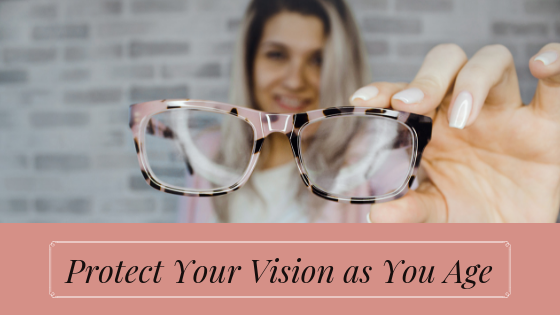The truth is, no one likes the prospect of growing older, yet according to a famous quote by Carl Jung:
Life really does begin at forty. Up until then, you are just doing research.
While the fountain of youth may remain elusive, many lifestyle choices (e.g., staying active, eating a balanced diet, and reducing your exposure to harmful ultraviolet rays) can help naturally slow the signs of aging.
Adopting healthy habits such as these may also decrease your chances of developing more serious eye diseases such as age-related macular degeneration (AMD), cataracts, and glaucoma.
Age-Related Eye Problems
Presbyopia
Are you holding your book farther away from your eyes than you used to? This is a common sign of presbyopia – “the inability to read fine print, thread a needle, or do other up-close tasks” – which is due to the normal hardening of the eye’s lenses. Presbyopia often affects people sometime after their fortieth birthday. A quick trip to your local pharmacy for a pair of reading glasses can correct presbyopia. Refractive surgery is another effective treatment option.
The symptoms of presbyopia include:
- Eyestrain
- Headaches
- Farsightedness
- The need for increased light when reading
Cataracts
More than 25 million Americans are estimated to suffer from cataracts – a clouding of the eye’s lenses that impairs vision – according to Prevent Blindness. Most cataracts form because of excessive exposure to ultraviolet light or changes related to aging, although other factors such as smoking, or diabetes may play a role. The only effective treatment option for cataracts is surgery. The procedure, which is performed by an ophthalmologist on an outpatient basis, involves replacing the affected lens with an artificial one.
The symptoms of cataracts may include:
- Poor night vision
- Blurred or double vision
- Fading or yellowing of colors
- Sensitivity to light and glare
- Frequent eyeglass prescription changes
Glaucoma
Glaucoma is an eye disease that damages the optic nerve. It may result in vision impairment, and if left untreated, blindness. There are several different types of glaucoma, including open-angle (chronic) glaucoma, normal-tension glaucoma, angle-closure (acute) glaucoma, and secondary glaucoma. Excessive eye pressure, caused by a buildup of aqueous humor, is believed to cause glaucoma. People who are forty and over, have a family history of glaucoma, or suffer from diabetes or high blood pressure are most at risk.
Glaucoma usually produces no symptoms. That is why scheduling annual comprehensive eye exams is vital for protecting your vision.
Age-Related Macular Degeneration
Age-related macular degeneration (AMD), a leading cause of vision loss in the U.S. for people fifty and older, damages the macula. It affects central vision, ultimately interfering with everyday activities, such as reading and driving. Age is a significant risk factor for AMD as is smoking and a family history of age-related macular degeneration. High blood pressure or high cholesterol may increase your risk of developing age-related macular degeneration as well.
The symptoms of AMD may include:
- Blurry, distorted, or dark center field of view
- Objects that do not appear as bright as they once were
6 Tips to Protect Your Vision
- Stop smoking
- Stay hydrated
- Exercise regularly
- Eat a healthy and balanced diet
- Schedule annual comprehensive eye exams
- Protect your eyes against UV-A and UV-B wavelengths by wearing sunglasses
Schedule an Appointment Today
Whether you need to schedule an annual, comprehensive eye exam or you require surgical vision correction to treat cataracts or other eye diseases, you can always expect to receive the highest quality care at Eye Physicians of North Houston. Contact us today (281) 893-1760 for more information or to schedule an appointment with one of our ophthalmologists.
Resources:

